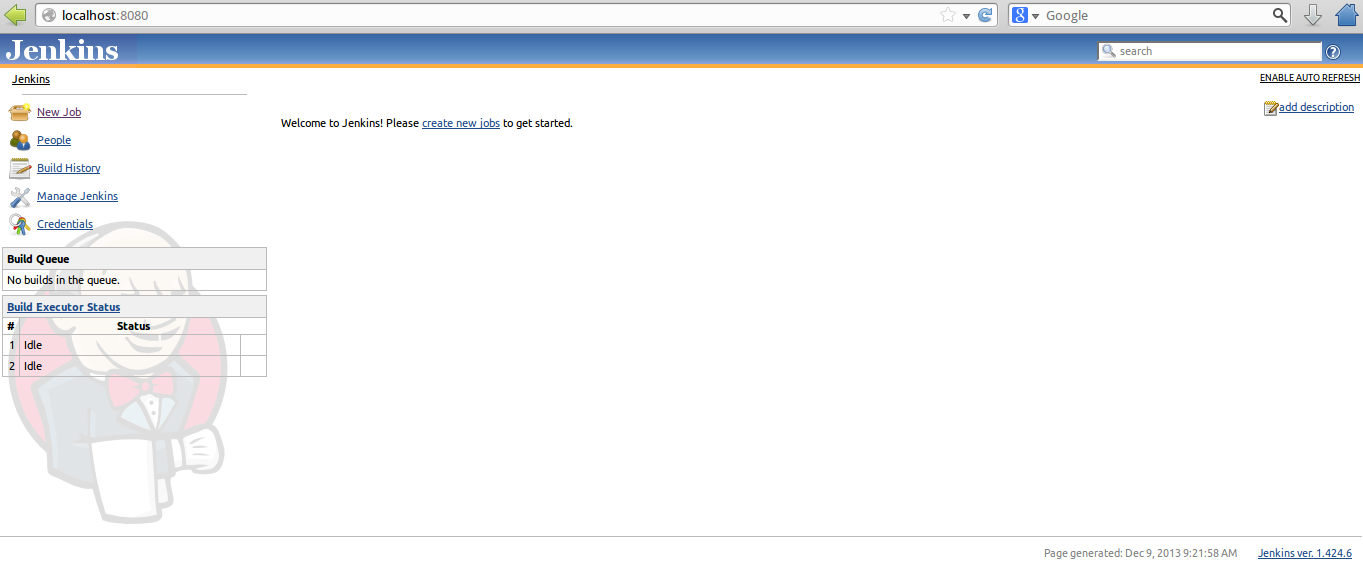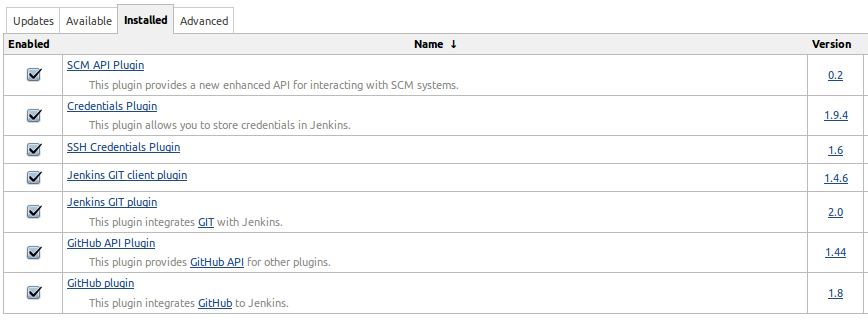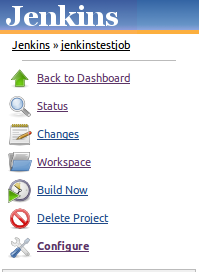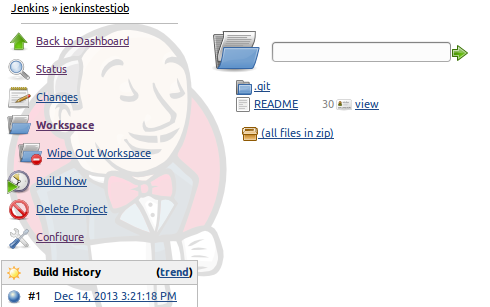Jenkins module to Puppet
If you haven’t seen my previous tutorials you should see them:
How to install Puppet, Hello World module using template to Puppet,
Installing Apache and PHP with Puppet module, Installing Puppet master and slaves,
Parametrized Class with Puppet, Define Types example in Puppet, How to get shared Git repository to server.
I’m using Xubuntu 12.04.03.
In this tutorial I’m creating module that:
- Installs Git and Jenkins ( Service makes sure Jenkins is up and running )
- Adds 7 plugins that Jenkins needs to get Git working in Jenkins ( Service restarts Jenkins if some plugin is added )
I install:
- Git 1.7.9.5
- Jenkins 1.424.6
Plugins - credentials.hpi 1.9.4
- git.hpi 2.0
- github.hpi 1.8
- ssh-credentials.hpi 1.6
- git-client.hpi 1.4.6
- github-api.hpi 1.44
- scm-api.hpi 0.2
Jenkins module
Install Puppet, create folders and init.pp.
$ sudo apt-get update && sudo apt-get -y install puppet
$ mkdir -p modules/jenkins/manifests/
$ nano modules/jenkins/manifests/init.ppInit.pp is using plugins.pp define type file to adding all plugins files.
class jenkins {
$pathvariable = "/var/lib/jenkins"
$sourcevariable = "puppet:///modules/jenkins"
package {'git':
ensure => present,
}
package {'jenkins':
ensure => present,
}
service {'jenkins':
ensure => running,
enable => true,
require => Package["jenkins"],
}
file{[$pathvariable, "${pathvariable}/plugins"]:
ensure => directory,
owner => "jenkins",
group => "jenkins",
mode => 755,
require => Package["jenkins"],
notify => Service["jenkins"],
}
jenkins::plugins {"${jenkins::pathvariable}/plugins/credentials.hpi":
pluginpath => "${sourcevariable}/credentials.hpi",
}
jenkins::plugins {"${jenkins::pathvariable}/plugins/git-client.hpi":
pluginpath => "${sourcevariable}/git-client.hpi",
}
jenkins::plugins {"${jenkins::pathvariable}/plugins/git.hpi":
pluginpath => "${sourcevariable}/git.hpi",
}
jenkins::plugins {"${jenkins::pathvariable}/plugins/github-api.hpi":
pluginpath => "${sourcevariable}/github-api.hpi",
}
jenkins::plugins {"${jenkins::pathvariable}/plugins/github.hpi":
pluginpath => "${sourcevariable}/github.hpi",
}
jenkins::plugins {"${jenkins::pathvariable}/plugins/scm-api.hpi":
pluginpath => "${sourcevariable}/scm-api.hpi",
}
jenkins::plugins {"${jenkins::pathvariable}/plugins/ssh-credentials.hpi":
pluginpath => "${sourcevariable}/ssh-credentials.hpi",
}
}Plugins.pp determines plugins .hpi files configures.
$ nano modules/jenkins/manifests/plugins.pp
define jenkins::plugins ($pluginpath) {
file {"$title":
ensure => file,
source => $pluginpath,
owner => "jenkins",
group => "jenkins",
mode => 644,
notify => Service["jenkins"],
require => File["${jenkins::pathvariable}/plugins"],
}
}Create files folder where you add .hpi files what Jenkins needs to have to get plugins working. Module copies these files to /var/lib/jenkins/plugins/
$ mkdir -p modules/jenkins/files/
$ cd modules/jenkins/files/
$ wget https://updates.jenkins-ci.org/download/plugins/credentials/1.9.4/credentials.hpi
$ wget https://updates.jenkins-ci.org/download/plugins/git-client/1.4.6/git-client.hpi
$ wget https://updates.jenkins-ci.org/download/plugins/git/2.0/git.hpi
$ wget https://updates.jenkins-ci.org/download/plugins/github-api/1.44/github-api.hpi
$ wget https://updates.jenkins-ci.org/download/plugins/github/1.8/github.hpi
$ wget https://updates.jenkins-ci.org/download/plugins/ssh-credentials/1.6/ssh-credentials.hpi
$ wget https://updates.jenkins-ci.org/download/plugins/scm-api/0.2/scm-api.hpi
$ cd ../../..Apply module. This could take couple minutes because Jenkins installation could take a while.
$ sudo puppet apply --modulepath modules/ -e 'class {"jenkins":}'Something like this should terminal print if module works
notice: /Stage[main]/Jenkins/Package[git]/ensure: ensure changed 'purged' to 'present'
notice: /Stage[main]/Jenkins/Package[jenkins]/ensure: ensure changed 'purged' to 'present'
notice: /Stage[main]/Jenkins/Jenkins::Plugins[/var/lib/jenkins/plugins/github.hpi]/File[/var/lib/jenkins/plugins/github.hpi]/ensure: defined content as '{md5}9b5f1bb17a78e77c390528b25b84071a'
notice: /Stage[main]/Jenkins/Jenkins::Plugins[/var/lib/jenkins/plugins/github-api.hpi]/File[/var/lib/jenkins/plugins/github-api.hpi]/ensure: defined content as '{md5}7969f66ebad949af4aac8836c8e83a8a'
notice: /Stage[main]/Jenkins/Jenkins::Plugins[/var/lib/jenkins/plugins/git-client.hpi]/File[/var/lib/jenkins/plugins/git-client.hpi]/ensure: defined content as '{md5}3d4001519e93206b3bbf7f932bcce41c'
notice: /Stage[main]/Jenkins/Jenkins::Plugins[/var/lib/jenkins/plugins/ssh-credentials.hpi]/File[/var/lib/jenkins/plugins/ssh-credentials.hpi]/ensure: defined content as '{md5}d708cebf8722261fe680d331f9096ace'
notice: /Stage[main]/Jenkins/Jenkins::Plugins[/var/lib/jenkins/plugins/credentials.hpi]/File[/var/lib/jenkins/plugins/credentials.hpi]/ensure: defined content as '{md5}1dc8897de4880f3d3f634b345ead856c'
notice: /Stage[main]/Jenkins/Jenkins::Plugins[/var/lib/jenkins/plugins/git.hpi]/File[/var/lib/jenkins/plugins/git.hpi]/ensure: defined content as '{md5}7c009e0c0fb588e945edd1cc9f313330'
notice: /Stage[main]/Jenkins/Jenkins::Plugins[/var/lib/jenkins/plugins/scm-api.hpi]/File[/var/lib/jenkins/plugins/scm-api.hpi]/ensure: defined content as '{md5}9574c07bf6bfd02a57b451145c870f0e'
notice: /Stage[main]/Jenkins/Service[jenkins]/enable: enable changed 'false' to 'true'
notice: /Stage[main]/Jenkins/Service[jenkins]: Triggered 'refresh' from 7 events
notice: Finished catalog run in 169.58 secondsLet’s see if Jenkins is really working
$ firefox localhost:8080It works!

Let’s check if plugins really installed. Push manage Jenkins

And select manage plugins

Choose installed plugins. We are installed 7 plugins. All is there what we need to get Git plugin working in Jenkins

Test project to Jenkins
Let’s create testproject to Jenkins.
Default folder to Git repository I use /home/soivishare/repository/helloGit.git
If you wanna use this here is tutorial how to get it working:
How to get shared Git repository to server
But you can easily change it giving attributes to parameterized class.
Create new module and init.pp.
$ mkdir -p modules/jenkinstestjob/manifests/
$ nano modules/jenkinstestjob/manifests/init.ppGrpath is variable which determines path of the repository. This module checks if config.xml exists do not replace it.
class jenkinstestjob($grpath = "/home/soivishare/repository/helloGit.git") {
$pathvariable = "/var/lib/jenkins/jobs/jenkinstestjob"
file { $pathvariable:
ensure => directory,
group => "jenkins",
mode => 755,
owner => "jenkins",
notify => Service["jenkins"],
}
file { "${pathvariable}/config.xml":
ensure => present,
replace => no,
content => template('jenkinstestjob/config.xml.erb'),
group => "jenkins",
mode => 644,
owner => "jenkins",
require => File[$pathvariable],
notify => Service["jenkins"],
}
service {'jenkins':
ensure => running,
enable => true,
}
}Create template config.xml.erb.
$ mkdir -p modules/jenkinstestjob/templates/
$ nano modules/jenkinstestjob/templates/config.xml.erbThis is copy of normal config.xml in jenkins jobs, but url variable is now <%= grpath %>.
So the path of the repository is easy to change when running module the first time.
<?xml version='1.0' encoding='UTF-8'?>
<project>
<actions/>
<description></description>
<keepDependencies>false</keepDependencies>
<properties/>
<scm class="hudson.plugins.git.GitSCM">
<configVersion>2</configVersion>
<userRemoteConfigs>
<hudson.plugins.git.UserRemoteConfig>
<url><%= grpath %></url>
</hudson.plugins.git.UserRemoteConfig>
</userRemoteConfigs>
<branches>
<hudson.plugins.git.BranchSpec>
<name>*/master</name>
</hudson.plugins.git.BranchSpec>
</branches>
<doGenerateSubmoduleConfigurations>false</doGenerateSubmoduleConfigurations>
<submoduleCfg class="list"/>
<extensions/>
</scm>
<canRoam>true</canRoam>
<disabled>false</disabled>
<blockBuildWhenDownstreamBuilding>false</blockBuildWhenDownstreamBuilding>
<blockBuildWhenUpstreamBuilding>false</blockBuildWhenUpstreamBuilding>
<triggers class="vector"/>
<concurrentBuild>false</concurrentBuild>
<builders/>
<publishers/>
<buildWrappers/>
</project>Now you can run module and use default path /home/soivishare/repository/helloGit.git
$ sudo puppet apply --modulepath modules/ -e 'class {"jenkinstestjob":}'Or change repository path example our TiPi project.
$ sudo puppet apply --modulepath modules/ -e 'class {"jenkinstestjob": grpath => "https://github.com/Scionar/TiPi.git"}'New job is added to jenkins. Push jobs name.

Choose configure

In here you can see what is repositorys path and you can make changes to project if you like

Push Build Now. Project is building and after that you can see in workspace your git project.

Your folder tree should look like this.
modules/
├── jenkins
│ ├── files
│ │ ├── credentials.hpi
│ │ ├── git-client.hpi
│ │ ├── git.hpi
│ │ ├── github-api.hpi
│ │ ├── github.hpi
│ │ ├── scm-api.hpi
│ │ └── ssh-credentials.hpi
│ └── manifests
│ ├── init.pp
│ └── plugins.pp
└── jenkinstestjob
├── manifests
│ └── init.pp
└── templates
└── config.xml.erbNow you have Jenkins module that installs Git plugin. You have testproject what uses Jenkins and Git plugin.